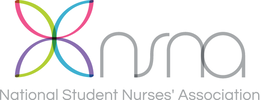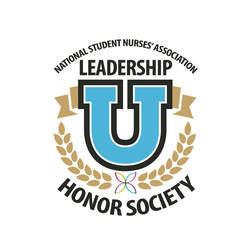Professional Identity Formation in Nursing*
The NSNA Leadership University Honor Society accelerates your formation of a professional identity in nursing. Nursing school is the beginning of your leadership journey that will advance your career and contribute to the advancement of the nursing profession. NSNA provides numerous opportunities for you to learn about the many facets of the nursing profession, including
- Population and Global Health.
- Breakthrough to Nursing (recruitment into the profession).
- Ethics and Governance.
- Health Policy and Advocacy.
- Image of Nursing.
- Governing a school chapter, state association, and national organization.
Think, Act, and Feel Like a Nurse
The signposts of professional Identity in Nursing include Values and Ethics, Leadership, Knowledge, and Professional Comportment.* By practicing leadership in nursing school, you will apply and integrate learning to build self-confidence and knowledge. You will be better prepared to think, act and feel like a professional nurse and transition into nursing practice and leadership roles as a new graduate RN.
*NSNA is collaborating with Nelda Godfrey, PhD, ACNS-BC, RN, FAAN, ANEF
Professor and Associate Dean, Innovative Partnerships and Practice, University of Kansas School of Nursing, Kansas City, Kansas, and The International Society for Professional Identity in Nursing work group led by Debra Liebig, MLA, BSN, RN, NPD-BC, Program Manager, Service & Performance Excellence, Accreditation & Regulatory Readiness Department, Children’s Mercy Kansas City, MO, to foster awareness of students and faculty about the need for a Professional Identity in Nursing.
Professor and Associate Dean, Innovative Partnerships and Practice, University of Kansas School of Nursing, Kansas City, Kansas, and The International Society for Professional Identity in Nursing work group led by Debra Liebig, MLA, BSN, RN, NPD-BC, Program Manager, Service & Performance Excellence, Accreditation & Regulatory Readiness Department, Children’s Mercy Kansas City, MO, to foster awareness of students and faculty about the need for a Professional Identity in Nursing.
Six Steps to Successful Formation of a Professional Identity in Nursing
NSNA’s Leadership U Honor Society is an excellent opportunity to be a part of something bigger. It allows you to build on your leadership skills and grow as a leader while forming your professional identity in nursing. Make the most of your nursing education as a student leader and engage in the teamwork needed to make things happen through your local chapter, state association, and national organization. There are six steps to the successful formation of a professional identity in nursing:
1. Ask yourself . . .
2. Self-assessment and learn about your leadership strengths and how to build on those strengths
3. Learn the formal skills needed to manage a school chapter or state association
4. Practice the informal skills of leadership
5. Expand your horizons
6. Celebrate success all along the way to forming a professional identity in nursing
We have defined each of these steps below.
#1 Ask yourself:
#2 Self-assessment to learn about your leadership strengths and how to build on those strengths by:
Not an NSNA member? Join here!
©2022 National Student Nurses’ Association, Inc.
NSNA’s Leadership U Honor Society is an excellent opportunity to be a part of something bigger. It allows you to build on your leadership skills and grow as a leader while forming your professional identity in nursing. Make the most of your nursing education as a student leader and engage in the teamwork needed to make things happen through your local chapter, state association, and national organization. There are six steps to the successful formation of a professional identity in nursing:
1. Ask yourself . . .
2. Self-assessment and learn about your leadership strengths and how to build on those strengths
3. Learn the formal skills needed to manage a school chapter or state association
4. Practice the informal skills of leadership
5. Expand your horizons
6. Celebrate success all along the way to forming a professional identity in nursing
We have defined each of these steps below.
#1 Ask yourself:
- Do I aspire to be a leader of the nursing profession?
- How do I develop and practice leadership and followership skills?
- Do I want to be part of a team that governs the school chapter, state association, and NSNA?
- How can I participate in projects and activities that develop valuable personal and professional skills?
- How do I build a valuable network for career advancement before graduation?
- Where can I learn about professional identity in nursing formation—what it is and what it means to me?
#2 Self-assessment to learn about your leadership strengths and how to build on those strengths by:
- Interacting with fellow students in professional peer relationships.
- Engaging in community service-learning projects and activities sponsored by your student nurses’ association (SNA).
- Using innovation and experience to solve problems and create new programs and activities.
- Reflecting on your experiences and gaining valuable insights about interactions with your peers and others.
- Erasing fear of failure and learning from mistakes.
- Celebrating success by recognizing all involved in achieving goals.
- Charting the growth and development of your professional identity formation in nursing (based on values/ethics; leadership, knowledge, and professional comportment).
- Good working knowledge of fiduciary responsibility of being on a Board of Directors.
- Understand your role as well as the role of other board members and how these all work together to produce results.
- Know how to lead a meeting or to be a participant in a meeting.
- Learn about as well as seek guidance to ensure that legal, regularity requirements, and school regulations (for a school chapter) are met for the continuity of your SNA.
- Understand the role of chapter/association bylaws in maintaining the continuity of your SNA.
- Develop relationships with faculty and school administrators.
- Actively engage in succession planning to ensure that future leaders are cultivated to lead the chapter/association.
- Ensure that decisions are guided by values and ethics, and knowledge about shared governance.
- Examine personal and professional communication skills when interacting with diverse populations and situations.
- Ask questions even when you may already know the answers.
- Listen to all sides of an issue before making decisions.
- Respect, honor, and value all with whom you interact to maintain the highest level of civility.
- Develop a positive, authentic attitude in all situations.
- Take care of your appearance and dress for success.
- Be accountable for your actions: think, act, and feel like a nurse.
- Create chapter/association programs that address issues of importance to nursing students and healthcare beyond the school level.
- Explore and practice the role of advocacy in nursing.
- Engage the chapter/association in proposing resolutions for the chapter, state association, and NSNA that address state and national issues.
- Run for chapter, state, and national elected office.
- Work with community-based organizations to involve members in community service.
- Understand how elected bodies and regulatory agencies make policy decisions at the local, state, and national levels of government.
- Surpass your comfort zone by participating in leadership beyond your school, work, and home setting.
- Learn how your leadership skills and experiences relate to hospital shared governance and unit practice councils.
- Apply for the NSNA Leadership University Honor Society.
- Recognize all involved in the success of your chapter/association (create recognition awards and present certificates to all involved).
- Encourage and mentor your peers and bring out the best in people.
Not an NSNA member? Join here!
©2022 National Student Nurses’ Association, Inc.
Copyright © 2024

